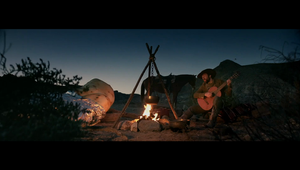
How to Capture Your Own Definition of Beauty with Faramarz Gosheh

Oscar Wilde coined the phrase “life imitates art far more than art imitates life.” So what duty do we have as storytellers to create a better tomorrow through our own medium? Faramarz Gosheh, a director at Stadium, sat down with us to discuss how his journey as a black filmmaker has shifted the lens in which he chooses to capture our world.
Q> Tell us about your upbringing and background and how it influences the lens in which you tell stories.
Faramarz> I grew up in an artist's home, where my mother expressed herself through paintings – ranging from women in Iran under oppression to more abstract. Looking back I think all those colours, brush strokes and boldness subconsciously inspired me to pursue a creative career. Being half-Persian, half-Nigerian, born and raised in Sweden I’ve always been a minority and have tried to fit in. I’ve never been the loudest one, I chose to find my space as a curious observer. That curiosity in people combined with a camera has helped me build relationships and access rooms in many different parts of our world.
I’ve gravitated towards providing a voice to the people who exist in the margins of our society, portraying them through my definition of beauty. Whether that be a film or photos of people experiencing hope, frustration, or a dreamy feel-good vibe.
Q> How do you go about building a team of creatives from different backgrounds and how does that improve your work on set?
Faramarz> When selecting a crew I value hunger and commitment, which means picking creatives, technicians, and interns who are less represented and less experienced, opening a door that was once opened for me. I think advertising and film are so much about perspective. If we don’t work with people with different backgrounds, age groups, and genders how do we think we’ll be able to reach the whole audience?
For a lot of people, they need to see themselves represented in stories before they work up the courage to take the leap into a creative field. Being a role model is vital for those who don’t have a support system or understanding of their surroundings, or how to pursue a career in the arts.
Q> Talk me through your casting process and how you create memorable characters in your films and ads?
Faramarz> I love capturing my definition of beauty that feels real to me. I seek out characters that can communicate through their eyes or body language - I like that sort of subtle storytelling.
My approach with the cast is similar to the one with the crew. I’m looking for people with beautiful energy who are willing to give it their all during the shoot day. It’s a mix of professional actors, friends, acquaintances, family, and street casting.
Q> Your films feel lived-in and fully realised, as if the talent has been going about their lives for years and you just happen to capture it. How do you curate those nuanced and vulnerable moments from your talent?
Faramarz> I need to connect with my talent. Sometimes it’s through a Facetime call a week prior to the shoot and sometimes it’s a deep chat on set in between takes. The bottom line is that I want to build a safe space for my cast and crew, as well as give them a sense of ownership over the project.
I’m specific about what energy I want to convey during a certain scene, but I’m open to exploring with my crew and talent how we go about achieving that message. That way your collaborators will share emotions and experiences that help the project feel more true and nuanced. More and more I pull references from my traveling, relationships, and conversations and throw bits of that into my films.
Q> What’s been the biggest life lesson you’ve learned while directing?
Faramarz> Patience.
Q> What’s been your biggest challenge as a director and how have you overcome it?
Faramarz> Understanding patience. The rhythm and flow of the commercial film landscape is complex, there are so many factors bigger than yourself, determining if you pitch multiple times a month or four times a year. Trends, world economy, politics, etc. On productions, there are a lot of factors you’re likely to impact as a director. Off set, in between jobs, not so much. So the ability to stay composed when work is slower and take that opportunity to reflect, learn, and commit to passion projects have been a major key. I’m not going to lie, it’s still frustrating at times. But I try to work on my inner voice and be kind to myself because directing is a marathon and I’m on the first couple of kilometres.
Q> What type of work are you looking to direct more of in 2024?
Faramarz> Memorable, honest, quirky and beautiful. I always aim to work with brands and agencies that are willing to take their audiences on an emotional journey.
Q> Directors have a multitude of reasons for why they’ve chosen this career path. What’s your why?
Faramarz> This career path feels like a hobby. I still have the same excitement I had starting out 10-ish years ago. I simply love creating with other fellow nerds and making films that move people.















